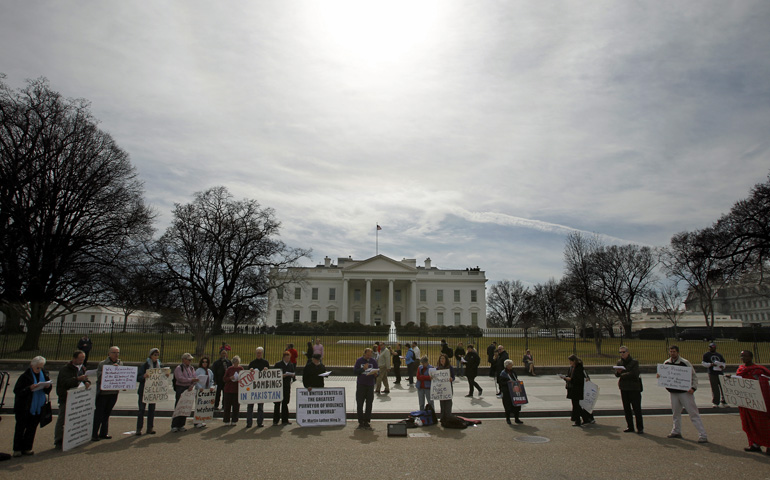
Peace and justice activists hold signs calling for societal repentance during a prayer service in front of the White House in Washington Feb. 22, 2012. (CNS/Peter Lockley)
Watching newsreel footage of rallies against the Vietnam War in the 1960s and 1970s, one is struck by the large numbers of Catholic religious men and women who joined those protests. The antinuclear protests of the 1980s also drew many Catholics. Yet with the U.S. in the second decade of a war on terror, can the same be said of today's anti-war movement? Is there anything significant enough to be called a Catholic peace movement in the United States?
In June, at its 40th anniversary national conference in Atlanta, Pax Christi USA drew fewer than 200 people. The group that bills itself as the "national Catholic peace movement" is struggling to increase membership and raise funds. At present, Pax Christi USA includes just four full-time staff members and a part-time bookkeeper, down from the days when more than a dozen were on staff.
JustFaith Ministries, the Louisville, Ky.-based organization that provides peace-and-justice-themed faith formation resources for parishes, has seen interest in its programs level off in the last two years following nine years of growth, said founder and president Jack Jezreel.
Carole Poth, associate director of Marquette University's Center for Peacemaking in Milwaukee, said she gets few bites when she invites students to attend anti-war or peace events.
"It's a struggle finding students who are passionate about being involved in the peace movement," Poth said. "We have a lot of social justice, less peace activism."
There are myriad reasons Catholic peace activism seems to be in decline, but a major problem cited by those working for peace and justice is the lack of leadership coming from the church.
Jezreel said he has used his connections with diocesan peace and justice offices as a way to bring JustFaith programs into Catholic parishes. But Jezreel said he has fewer inroads as more and more bishops close those offices or combine them into multipurpose ministries.
Adam Brown, coordinator of the Washington, D.C.-based Roundtable Association of Catholic Diocesan Social Action Directors, said his organization has witnessed a steady decline in membership from 122 dues-paying diocesan members in 2007 to just 60 by 2012.
"The shrinking, combining and closing of social action offices has in many cases been due to budgetary constraints in dioceses," Brown said. "The faithful still hunger for social action, but the biggest problem is where the laity go if the social action office doesn't exist in their diocese or if their local priest or pastoral minister is not familiar with social justice."
JustFaith is looking toward more creative ways to do outreach, Jezreel said. He said permanent deacons "have been a great resource because they studied Catholic social teaching in their diaconate training."
In 1983, the U.S. bishops issued "The Challenge of Peace: God's Promise and Our Response," a pastoral letter on war and peace. Jezreel said nothing comparable has come "from this current core of bishops as a body over the last 30 years."
Poth, 60, says her generation benefited from having been taught by nuns who instilled a hunger for the Catholic faith. "In the classroom, the sisters had a strong influence on our lives on a daily basis," Poth said. "We learned to know what we should and should not be doing and that we may need to step out of our comfort zone to do the right thing."
However, Poth said, "The priests are the key, and they're not doing it." She said she knows just one priest in her area who preaches "a nonviolent Gospel, a nonviolent Jesus."
Michael Baxter, visiting associate professor of Catholic studies at DePaul University in Chicago, said he does see interest among students in peace studies programs, but "in terms of direct opposition to war," there are fewer local organizations with less active local chapters.
"I think part of that is due to the fact that most people are not cognizant that there's a war going on," Baxter said. "They don't feel it personally because of the lack of a draft."
Baxter teaches a class on coming home from war. Of the 40 students enrolled in the class this past spring, seven were veterans of the war on terror, he said. He plans to teach the class again this fall. "People need to meet people who have been to war," he said.
Baxter said his class looks at war's human consequences, giving students "a stronger sense of the tragedy and the horror of war."
He calls "The Challenge of Peace" "the great missed opportunity in American Catholic history" because the bishops failed to condemn nuclear weapons as intrinsically evil, but instead justified them on just war grounds.
When it comes to conventional warfare, Baxter said, "pro-war Catholics have very shrewdly argued that this is a matter of prudential judgment." When the bishops fail to make the case for "principled opposition to war," he said, participation in war "becomes a matter of free choice" for Catholics, unlike the vividly clear teachings that condemn abortion and euthanasia.
In his keynote address at the Atlanta Pax Christi gathering, Bishop Thomas Gumbleton told listeners that the church's embrace of the just war theory was "a terrible tragedy in the history of Christianity."
Gumbleton, retired auxiliary bishop of Detroit, told NCR that Pax Christi's purpose is not to attract large numbers to its rolls, but to remain faithful to the Gospel of nonviolence. Pax Christi "should stay small and get more radical," he said.
Both Gumbleton and Jezreel spoke of their excitement about Pope Francis, who has spoken often and with passion about the plight of the poor and the immorality of war.
"It's still an early papacy, but he's thrown out lots of clues about where he's going," Jezreel said.
Francis has also inspired Catholic Worker Kathy Boylan, a mother of five adult sons, to promote the pope's words every Sunday when she attends Mass at Holy Redeemer Church in Washington, D.C.: She wears a smock made out of a pillowcase hand-lettered with Francis' quote: "War is suicide for humanity."
Deacon Thomas Cornell, who lives at the Peter Maurin Catholic Worker Farm in Marlboro, N.Y., said with such documents as Pacem in Terris and Gaudium et Spes, "we have all we need, on paper at least, and with Pope Francis yet more. What remains to make the Roman Catholic church a true peace church is to make these teachings known as well as the church's attitude toward abortion."
Kathy Kelly, co-coordinator of Voices for Creative Nonviolence, said she prefers to spend her time focusing on "the mystical body concept," rather than lamenting what's going on with the church hierarchy.
In her travels, Kelly said, she meets young activists by seeking them out where they are. "If you go to the places where the works of mercy are being exercised, you see young people, fantastic young people who roll up their sleeves and undertake hard work and make sacrifices," she said. "I think it's important to look towards the ones who are really exercising their Christianity in important ways."
Stephen Dear, executive director of People of Faith Against the Death Penalty, says the U.S. peace movement "doesn't really exist," and a new, broader peace movement must be established.
"I don't think we can separate issues into silos anymore," he said. "We have to connect the U.S. military empire and multinational corporate hegemony to climate change and local issues. We need fusion politics among Latino, black, Asian and white communities and interweaving among groups concerned about the environment, civil rights, militarism, economic justice, etc.
"Organizers should look outside America for new organizing models and for inspiration. Ordinary people have to sacrifice their careers and become grassroots organizers. Organizing seems like our only hope. Not prophetic witness, organizing. We need to go out and sit down with the pastors, rabbis, imams and all pastoral leaders in our communities and invite them to join our efforts. We need to ask our local government leaders to pass resolutions on these issues. We need to be creative in our hometowns and fellowship halls."
[Patrick O'Neill is a freelance writer living in Raleigh, N.C.]


